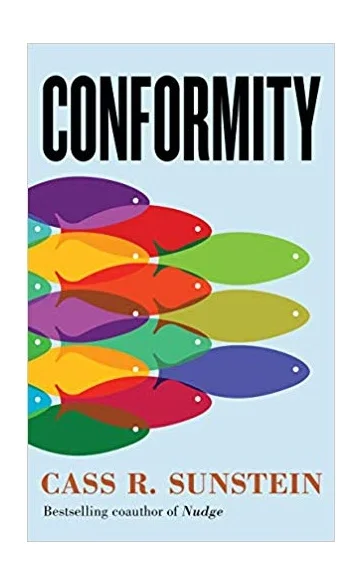Advance Book Review: Conformity by Cass Sunstein
This is a quick read that gives a decent albeit short overview of the power of conformity and how it manifests itself in society. It grew out of a speech Sunstein delivered at Harvard Law School that was actually already adapted into a book (Why Societies Need Dissent) later that year. Sunstein, who co-wrote Nudge with Richard Thaler and is currently a professor at Harvard Law School, asserts that Conformity is less incendiary and self-righteous than the earlier version and while I haven’t read that text Conformity did seem to treat its subjects even-handed throughout. Unfortunately much of the changes seem to center around tone rather than topics, so if you’re looking for a deep understanding of the increasing polarization and tribalization in contemporary politics you may find yourself unsatisfied (though thankfully books such as Amy Chua’s Political Tribes that accomplish that) but if you want a short primer on how conformity develops in societies this is a fine option.
Conformity is split into four sections and begins with a review of the major studies in the space including Solomon Asch’s line study and Sherif’s light movement study that will likely be familiar to anyone who took an introductory psychology course. The chapter hammers home that people who convey confidence are particularly influential, people are very reluctant to challenge unanimity, and individuals within the same “in group” are particularly vulnerable to groupthink and conformity. Sunstein draws upon this research to demonstrate the potentially deleterious effects of people hiding their true feelings due to group pressures. The following portion concerns social cascades, which Sunstein defines as a practice that spreads quickly through a population that can lead to dramatic changes and the third chapter is about how individual beliefs can become extreme in group settings through polarization effects. Sunstein concludes by applying the principles of conformity to the judicial and educational space by arguing for the benefits of ideological diversity on the federal bench and at colleges. The major message here is that it is vitally important to develop institutions that encourage individuals to share their true private beliefs and are open to dissent, which seems quite sensible though not exactly earth-shattering. Overall, Conformity is a readable account of the social forces at play when individuals follow the crowd but it likely won’t offer any new revelations to those somewhat familiar with the subject. I feel like Sunstein missed an opportunity to really differentiate his book by fleshing out the applications of conformity to more than just diversity in schools and courts and to share more of the recent research in the social sciences on the subject. Still, it’s a nice and quick summary of the subject.
6/10

